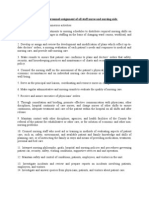Nurse Supervisor Roles and Responsibilities
Nurse Supervisor Roles and Responsibilities
Uploaded by
Patricia VasquezCopyright:
Available Formats
Nurse Supervisor Roles and Responsibilities
Nurse Supervisor Roles and Responsibilities
Uploaded by
Patricia VasquezOriginal Description:
Original Title
Copyright
Available Formats
Share this document
Read this document in other languages
Did you find this document useful?
Is this content inappropriate?
Copyright:
Available Formats
Nurse Supervisor Roles and Responsibilities
Nurse Supervisor Roles and Responsibilities
Uploaded by
Patricia VasquezCopyright:
Available Formats
NURSE SUPERVISOR ROLES AND RESPONSIBILITIES
Nursing supervisors provide a critical link between hospital management and clinical
care, overseeing patient-care operations, assigning and monitoring staff nurses and identifying
and implementing quality improvements. In the nursing supervisor role, registered nurses (RNs)
are ultimately responsible for healthcare teams and maintaining safe and smooth operations
within a unit.
Becoming a nursing supervisor typically means moving out of a direct care role and
shifting one’s duties toward administration. This managerial role is essential for every unit at a
hospital to run smoothly. Nursing supervisor jobs also involve directly interacting with
patients and their families in clinical settings. Like their nursing staff, nursing supervisors are
dedicated advocates for patients. Often working alongside staff nurses in treating patients,
nursing supervisors are keenly aware of patient concerns. When nurses are unable to share
patient observations with physicians, nursing supervisors represent nursing staff and report
their findings.
As the leaders of their team, nursing supervisors work with others in their area of care.
They ensure that each member understands clinical tasks and responsibilities, and they provide
critical feedback for other nurses, share their professional knowledge, arrange trainings, and
support their team as issues arise. Day-to-day tasks often include:
● Creating schedules. Nursing supervisors schedule and assign nurses to specific
patients and tasks and follow up on work results to ensure the highest quality of care.
● Planning treatment for patients. Individuals in this role interact with patients as well as
other nurses to plan and implement a course of treatment. They assist in measuring the
outcomes of specific treatments and adjust as necessary to ensure the wellbeing of
those in their care.
● Balance Staffing Needs with Personal Needs. To keep nurses on the job, nursing
supervisors ensure appropriate staffing levels across the entire facility while keeping
workloads manageable for individual nurses.
● Budget development and oversight. Nursing supervisors are not only in charge of
human resources and quality of care, but are also often responsible for their unit’s
financials. They monitor expenditures, create budgets, and make changes as necessary.
● Supervising the work of others. One of the most important tasks assumed by nursing
supervisors is selecting, training, coaching, and advising others on their team. They
make sure everyone adheres to organizational policies and completes their work
successfully. They also assess and evaluate ongoing performance of the nursing staff.
● Hiring, teaching and training. Nurse supervisors hire and train nurses who are new to
the profession or the facility by providing clear directions. They also conduct ongoing
staff training to ensure quality standards of the highest degree in nursing activities.
● Discipline. Nursing supervisors discipline staff members when necessary, using positive
techniques that emphasize retraining and reteaching rather than punishment and
embarrassment.
● Improve Work Environments. One of the keys to success in nursing supervisor jobs is
building knowledgeable and productive nursing teams that are effective in delivering
patient care.
● Improve Communication. Good relationships between nurse supervisors, nurses, and
doctors are imperative to delivering quality care as they coordinate nursing functions.
QUALIFICATIONS
Before taking on the role of a nursing supervisor, many find it necessary to complete
several degrees and significant on-the-job training. Through this process, nursing supervisors
gain in-depth knowledge of administrative and managerial practices and best practices in
healthcare, and learn vital organizational and problem-solving skills.
To become a nursing supervisor, students often complete the following steps:
1. Become a Registered Nurse. A career as a nursing supervisor involves intimate
knowledge of the ins and outs of healthcare and the role of the nurse in providing patient
care.
2. Gain Clinical Nursing Experience. Before stepping into a leadership role, most nurses
spend at least three to five years practicing. Having years of clinical experience as a
nurse before taking on a nursing supervisor role allows for greater perspective on the
responsibilities fulfilled by the team.
3. Earn a Master’s Degree. At a minimum, most employers require a Bachelor of Science
in Nursing paired with experience in the field to become a nursing supervisor. However,
many employers require that potential nursing supervisors also hold a master’s degree,
such as a Master of Science in Nursing. Advanced study prepares nurses for the
increasingly complex demands of executive leadership in healthcare.
References:
● Maryville University (2021). How to become a nursing supervisor. Retrieved From:
https://online.maryville.edu/online-masters-degrees/master-science-
nursing/careers/nursing-supervisor/
● Nursing Supervisor: Master of Science in Nursing Careers. (2018). Maryville Online.
https://online.maryville.edu/online-masters-degrees/master-science-
nursing/careers/nursing-supervisor/
● Role of the Nursing Supervisor in Hospital Settings. (2020, May 27). Duquesne
University School of Nursing. https://onlinenursing.duq.edu/blog/role-of-the-nursing-
supervisor-in-hospital-settings/
● Want to Become a Nursing Supervisor? Job Description and Fundamental Skills. (2019).
Norwich University Online. https://online.norwich.edu/academic-
programs/resources/nursing-supervisor-job-description
You might also like
- Dain-5 AccessBodyProcessesIntroducedandExplained PDFDocument5 pagesDain-5 AccessBodyProcessesIntroducedandExplained PDFRiitta Knuuti95% (19)
- Head Nursing Evaluation ToolDocument15 pagesHead Nursing Evaluation ToolSiegfried Punzalan Nuñez50% (2)
- Methods of Nursing AssignmentDocument30 pagesMethods of Nursing AssignmentRakersh Patidar92% (12)
- Staff Nurse Evaluation ToolDocument8 pagesStaff Nurse Evaluation ToolEmman Acosta Domingcil100% (1)
- Cardiovascular NCLEX QuestionsDocument33 pagesCardiovascular NCLEX QuestionsPatricia VasquezNo ratings yet
- Nurse Supervisor Roles and ResponsibilitiesDocument2 pagesNurse Supervisor Roles and ResponsibilitiesPatricia VasquezNo ratings yet
- Patient Classification SystemDocument25 pagesPatient Classification System1511katana97% (30)
- Role of The Head NurseDocument12 pagesRole of The Head Nurseمحمود على ما تفرج75% (4)
- Organizing Patient CareDocument18 pagesOrganizing Patient CareAqmarindaLailyaGhassani80% (5)
- Objectives of Staffing in NursingDocument10 pagesObjectives of Staffing in NursingEli Zza KoiralaNo ratings yet
- Nursing Management Is Performing Leadership Functions of Governance and DecisionDocument4 pagesNursing Management Is Performing Leadership Functions of Governance and DecisionLhen Vegas Cagahastian100% (1)
- Operational PlanDocument10 pagesOperational PlanIan Mizzel A. Dulfina100% (4)
- LATEST Draft of Nursing PoliciesDocument152 pagesLATEST Draft of Nursing PoliciesDe La Serna Mitz100% (3)
- The Organizational Structure of Nursing Service DepartmentDocument5 pagesThe Organizational Structure of Nursing Service DepartmentNikki Arra100% (8)
- Budgeting (Nursing Department)Document32 pagesBudgeting (Nursing Department)Adrienne Veronique Reyes75% (4)
- Leadership and Management in NursingDocument5 pagesLeadership and Management in NursingSolsona Natl HS Maananteng50% (2)
- Organizing Nursing Service and Patient CareDocument32 pagesOrganizing Nursing Service and Patient CareGrashia100% (3)
- 1.MOD On GERON (1) CommunicationDocument19 pages1.MOD On GERON (1) CommunicationPatricia VasquezNo ratings yet
- NCM 114 Care of The Older Adult Emelie Jalandoni Tan, RN., DnsDocument7 pagesNCM 114 Care of The Older Adult Emelie Jalandoni Tan, RN., DnsPatricia Vasquez100% (4)
- NCM 114 Care of The Older Adult Emelie Jalandoni Tan, RN., DnsDocument7 pagesNCM 114 Care of The Older Adult Emelie Jalandoni Tan, RN., DnsPatricia Vasquez100% (4)
- BLS Provider: Ma. Carmela C. VasquezDocument2 pagesBLS Provider: Ma. Carmela C. VasquezPatricia VasquezNo ratings yet
- Presentation MGTDocument14 pagesPresentation MGTnur_azian_6No ratings yet
- Organizing NSG ServiceDocument28 pagesOrganizing NSG ServiceAnusha VergheseNo ratings yet
- Duties and Responsibilities of A Head NurseDocument3 pagesDuties and Responsibilities of A Head NursevincevilNo ratings yet
- Organizing Nursing ServicesDocument83 pagesOrganizing Nursing ServicesJennah Ricci TuazonNo ratings yet
- Head NurseDocument3 pagesHead NurseLiza Noble-Roa100% (2)
- Staffing Power Point Final EditionDocument36 pagesStaffing Power Point Final EditionAnusha Verghese100% (1)
- Unit 1 Planning and Organization of Nursing Service: 1 0 ObjectivesDocument12 pagesUnit 1 Planning and Organization of Nursing Service: 1 0 ObjectivesRenita ChrisNo ratings yet
- Nursing ServicesDocument4 pagesNursing ServicesLloyd96% (27)
- Standards 2Document11 pagesStandards 2Krishnaveni MurugeshNo ratings yet
- Head NursingDocument11 pagesHead Nursingrouieghurl75% (4)
- Staff Development: Nursing AdministrationDocument33 pagesStaff Development: Nursing Administrationcara100% (2)
- 1.NCM 119 - ManagementDocument56 pages1.NCM 119 - ManagementEdgar Rebuyas100% (1)
- Organizing Nursing Services and Patient Car1Document34 pagesOrganizing Nursing Services and Patient Car1susy mary thomasNo ratings yet
- Nursing Core Competency PresentationDocument92 pagesNursing Core Competency Presentationleyshan100% (1)
- Nurse Supervisor Job DescriptionDocument1 pageNurse Supervisor Job DescriptionCharm TanyaNo ratings yet
- Head Nurse EvaluationDocument26 pagesHead Nurse EvaluationRichard281981100% (2)
- Clinical Teaching Plan SampleDocument9 pagesClinical Teaching Plan SampleElaine RetesNo ratings yet
- Directing and Controlling Nursing ServiceDocument13 pagesDirecting and Controlling Nursing ServiceAlyssa AzucenaNo ratings yet
- Nursing Management 1Document3 pagesNursing Management 1Danah Grace SanchezNo ratings yet
- Nursing SupervisorDocument2 pagesNursing SupervisorANTO JOHNNo ratings yet
- Total Quality Management (TQM) in Nursing Bu IraDocument14 pagesTotal Quality Management (TQM) in Nursing Bu IrapipitpanjaitanpitNo ratings yet
- Nursing Leadership and ManagementDocument3 pagesNursing Leadership and ManagementRI NA100% (1)
- DUTIES OF NURSING PERSONALS IN HOSPITAL WordDocument25 pagesDUTIES OF NURSING PERSONALS IN HOSPITAL Wordpooja singh100% (1)
- Occurrence Variance ReportDocument20 pagesOccurrence Variance ReportMobile AsdNo ratings yet
- Staffing - Nursing, Staffing Norms, Staff Estimation and SchedulingDocument54 pagesStaffing - Nursing, Staffing Norms, Staff Estimation and SchedulingSanjay Kumar Sanju100% (1)
- Nursing Superintendent Grade IIDocument2 pagesNursing Superintendent Grade IIAnusha Verghese100% (2)
- Roles and Responsibilities of A Chief Nursing OfficerDocument8 pagesRoles and Responsibilities of A Chief Nursing OfficerLourelie Malanog Erediano100% (1)
- Job DescriptionDocument22 pagesJob DescriptionHCX dghhq100% (1)
- Leadership StylesDocument5 pagesLeadership Styleskimonoberry100% (1)
- Practicum Level 1 Clinical Instructor Self Evaluation Performance ChecklistDocument1 pagePracticum Level 1 Clinical Instructor Self Evaluation Performance Checklistgreen_archer100% (3)
- Legal Aspects in NursingDocument4 pagesLegal Aspects in Nursinghnybnch100% (1)
- Organizing Management NursingDocument31 pagesOrganizing Management NursingAlfitoHarfahGiffary100% (1)
- StaffingDocument24 pagesStaffingagelesswapNo ratings yet
- Staffing Nursing ManagementDocument55 pagesStaffing Nursing Managementanreilegarde90% (21)
- FormulasDocument13 pagesFormulasSarah Salva100% (2)
- Responsibilities of Chief NurseDocument4 pagesResponsibilities of Chief NursejeckjeckNo ratings yet
- Legal ResponsibilityDocument3 pagesLegal ResponsibilityLigaya Sabalde RebongNo ratings yet
- Organizing in Nursing AdministrationDocument9 pagesOrganizing in Nursing Administrationailila5100% (1)
- Nursing AuditDocument36 pagesNursing AuditPhebeDimple100% (1)
- Seminar On-Planning For ChangeDocument53 pagesSeminar On-Planning For ChangeAarti RathaliyaNo ratings yet
- Job Description - Assistant Nursing SuperintendentDocument2 pagesJob Description - Assistant Nursing SuperintendentSheen BelsylinNo ratings yet
- Head NurseDocument2 pagesHead NurseEmJay Balansag100% (1)
- COMMUNITY HEALTH NURSE: Passbooks Study GuideFrom EverandCOMMUNITY HEALTH NURSE: Passbooks Study GuideNo ratings yet
- Name: Course §ion: Midterm ExamDocument5 pagesName: Course §ion: Midterm ExamPatricia VasquezNo ratings yet
- Summary The Filipino Community in SpainDocument6 pagesSummary The Filipino Community in SpainPatricia VasquezNo ratings yet
- NCPDocument11 pagesNCPPatricia VasquezNo ratings yet
- 8.3 IV Fluids, IV Tubing, and Assessment of An IV SystemDocument1 page8.3 IV Fluids, IV Tubing, and Assessment of An IV SystemPatricia VasquezNo ratings yet
- CHN Ncm112b Rle RequirementDocument27 pagesCHN Ncm112b Rle RequirementPatricia VasquezNo ratings yet
- CCN Lecture Altered PerceptionDocument4 pagesCCN Lecture Altered PerceptionPatricia VasquezNo ratings yet
- Path o PhysiologyDocument3 pagesPath o PhysiologyPatricia VasquezNo ratings yet
- Nursereview Org Therapeutic Communication TechniquesDocument6 pagesNursereview Org Therapeutic Communication TechniquesPatricia VasquezNo ratings yet
- Post-Job Interview AssessementDocument5 pagesPost-Job Interview AssessementPatricia VasquezNo ratings yet
- Nurse-Patient Interaction: (Requirement in Related Learning Experience)Document8 pagesNurse-Patient Interaction: (Requirement in Related Learning Experience)Patricia VasquezNo ratings yet
- Barangay TalisayanDocument7 pagesBarangay TalisayanPatricia VasquezNo ratings yet
- Npi Format For Rle 1Document9 pagesNpi Format For Rle 1Patricia VasquezNo ratings yet
- Chapter 17Document19 pagesChapter 17Patricia VasquezNo ratings yet
- Nursing Care Plan: Western Mindanao State University College of NursingDocument11 pagesNursing Care Plan: Western Mindanao State University College of NursingPatricia VasquezNo ratings yet
- Utritional Uidelines For IlipinosDocument3 pagesUtritional Uidelines For IlipinosPatricia VasquezNo ratings yet
- Quiz 2 Review Sheet: 6.101 Analog Electronics Lab March 19, 2007Document3 pagesQuiz 2 Review Sheet: 6.101 Analog Electronics Lab March 19, 2007VIJAYPUTRANo ratings yet
- AT&T Response To FCCDocument15 pagesAT&T Response To FCCJulie WolfeNo ratings yet
- Chapter 22 Exile in DapitanDocument4 pagesChapter 22 Exile in DapitanDwayne Aldrech Pecante100% (1)
- MD - Meraj - Mia For Sheraton HotelDocument3 pagesMD - Meraj - Mia For Sheraton HotelChef MerajNo ratings yet
- Fin Fisher Surveillance Malware Sales Brochure.Document58 pagesFin Fisher Surveillance Malware Sales Brochure.Juha SaarinenNo ratings yet
- Amicable SettlementDocument7 pagesAmicable Settlementally jumanneNo ratings yet
- Santiago Vs PioneerDocument2 pagesSantiago Vs PioneerKaye Patrice Andes ApuyanNo ratings yet
- Colour Image RestorationDocument8 pagesColour Image RestorationGayathri MadapatiNo ratings yet
- The Cowboy ChroniclesDocument60 pagesThe Cowboy ChroniclesChristain PakozdiNo ratings yet
- Reflectiveessay AshleyhancockDocument5 pagesReflectiveessay Ashleyhancockapi-273174764No ratings yet
- Zno WritingDocument40 pagesZno WritingНаталія Галамага100% (2)
- Elementary Social Studies CurriculumDocument34 pagesElementary Social Studies CurriculumMaricar Torres RamirezNo ratings yet
- IMTGT Transformation To Digital Economy?: Unicorns, Transformation and The Internet of ThingsDocument5 pagesIMTGT Transformation To Digital Economy?: Unicorns, Transformation and The Internet of ThingsWilliam AnthonyNo ratings yet
- What Makes A Good Leader Thesis StatementDocument6 pagesWhat Makes A Good Leader Thesis Statementnlcnqrgld100% (1)
- MODULE 6 A. UNDRIP, Economic Development and The Indigenous Peoples' Socio-Economic-Political RightDocument6 pagesMODULE 6 A. UNDRIP, Economic Development and The Indigenous Peoples' Socio-Economic-Political RightCa ShewNo ratings yet
- Honors World Literature - 10th Grade Syllabus (Fall 2016 Semester) Mr. Jackson (678) 277 9083 Ex. 715 Course DescriptionDocument3 pagesHonors World Literature - 10th Grade Syllabus (Fall 2016 Semester) Mr. Jackson (678) 277 9083 Ex. 715 Course Descriptionteenwolf4006No ratings yet
- Case StudyDocument55 pagesCase StudyKimberly MilaranNo ratings yet
- Econ 620 SyllabusDocument3 pagesEcon 620 SyllabusTOM ZACHARIASNo ratings yet
- Leadership Shekh MohammadDocument15 pagesLeadership Shekh MohammadRahul BindrooNo ratings yet
- Rephrases: Page - 1Document11 pagesRephrases: Page - 1Diana TudorNo ratings yet
- 9th Class Maths PDFDocument20 pages9th Class Maths PDFsrinivasbudati100% (2)
- Module 5 Verification and Validation of Simulation ModelsDocument15 pagesModule 5 Verification and Validation of Simulation ModelsPradyumna A KubearNo ratings yet
- Suhu Leopard Gecko DewasaDocument6 pagesSuhu Leopard Gecko DewasaOviradita NobmadellaNo ratings yet
- Group AttunementDocument8 pagesGroup Attunementdeepak_goyal198674No ratings yet
- Regional Anesthesia For CsDocument29 pagesRegional Anesthesia For CsMohmed El KingNo ratings yet
- About DharmaDocument8 pagesAbout DharmaAnonymous H9DkmZOgNo ratings yet
- Intradialytic Stretching Exercises On Fatigueand Muscle CrampsDocument6 pagesIntradialytic Stretching Exercises On Fatigueand Muscle CrampsInternational Journal of Innovative Science and Research TechnologyNo ratings yet
- Matrices & Linear Algebra Module G-20 (Maths) : Day Date DAY Unit Topic Sub-Topics Exercise InstructionsDocument2 pagesMatrices & Linear Algebra Module G-20 (Maths) : Day Date DAY Unit Topic Sub-Topics Exercise InstructionssagarNo ratings yet












































































































